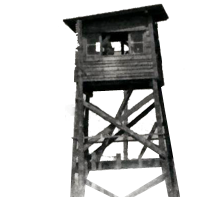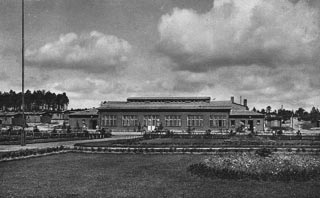

The wars of 1870-1871 and 1914-1918 were, for example, two periods in which France had to undergo this kind of ordeal. The following were captured : Wounded soldiers left on the battlefield, combatants reduced to impotence for various reasons, either in the open country or in entrenched camps or fortifications.
In 1870-71, the number of prisoners taken by the Germans was large enough to influence the course of the war and France's decision to stop fighting.
In contrast, in 1914-1918, the number of prisoners, although far from negligible was not a determining factor in the decisions taken by the civilian and military leaders.
This was not the case in 1940. And to understand the importance of the ordeal suffered by our country at that time, it is necessary to recall the main lines of the military operations of the time. From September 1939 to 9 May 1940, the French and German armies remained within their borders. Only a few small-scale operations, carried out by small numbers of troops, gave rise to infrequent fighting in Lorraine and Alsace. These gave the French and the Germans the opportunity to take some prisoners, mainly young officers and men of the rank and file who felt the humiliation and painful constraints of internment in enemy country.
This was the so-called "phoney war", during which France, initially unprepared for major military action, tried to complete the armament of its forces.
On 10 May 1940, the situation changed completely. German forces entered Holland and Belgium, pushed aside French, British and Belgian forces which sought to oppose their advance, broke through French defences at Sedan and reached Amiens and the Pas-de-Calais coast within days. A very large part of the allied force was thus surrounded in Flanders, in conditions which led it to stop fighting. Despite the embarkation of certain units at Dunkirk to reach England, the Germans thus captured an extremely important first group. The remaining available French formations then occupied a line along the Somme, the Aisne and connecting with the Maginot line in the north-east of the country. But too few in number, with insufficient material potential, they were unable to resist a general attack launched by the Germans towards the south and south-east, from 5 June. They had to make successive withdrawals which totally disrupted them. During these withdrawals, marked on 14 June by the Germans' entry into Paris, bloody and often heroic battles were fought, but they were soon uncoordinated and ineffective. Many French combatants were surrounded and neutralised, either individually or in groups of varying size, sometimes without even being able to use their weapons. It was not until the Armistice was signed on 22 June that this rout came to an end well south of the Loire, from 25 June onwards, the date set for the end of the fighting.
Within six weeks the French armies, buffeted by German air and ground forces had lost 100,000 killed and an exorbitant 1,800,000 prisoners of all ranks (about 35% of the French army's strength). The morale of the latter, as well as that of the civilian population, part of which had taken the path of exodus towards the south as early as 10 May, could not but be deeply influenced by such a disaster. A complete study of this influence would require a special, necessarily long, study, which is not envisaged for the moment. Moreover, it must be borne in mind that, because of the very large number of men involved, their reactions were very diverse and sometimes contradictory. In spite of this reservation, it is possible to retain the following:
As soon as they were captured, unarmed and under the surveillance of sentries ready to use their weapons to ensure compliance with the orders or instructions given by their leaders, the prisoners of 1940 necessarily felt a very great sadness when they saw the impressive superiority of the enemy. There followed a feeling of humiliation and, one might say, of dishonour, in so far as, individually or collectively, they had not been able to fulfil their mission. They were tired from the operations and withdrawals of the days before their capture, sometimes physically shattered. Food and drink were in short supply, especially when the prisoners were in large columns. Officers were separated from non-commissioned officers and men; the moral support that could be expected from unit cohesion disappeared. Each one was soon isolated in a group of unknown fighters from different backgrounds. Moreover, the uniforms were often disparate and quickly became faded, if not dirty, which gave an unpleasant and demoralising impression of the group. Moreover, the seriousness of the events that the prisoners had just experienced or that they had learned about in bits and pieces, caused a dejection that reinforced the initial sadness. They were looking for the part they had played in the disaster, the mistakes they had made, the consequences of their captivity for their personal future. As a group, they wondered how and why France had come to such a dramatic situation. Thus, many were tempted by discouragement or resignation. Some thought that such a national ordeal could not last long and hoped for a quick release. Others bitterly regretted not having taken advantage of the opportunity to escape the sentries' surveillance and reach the area not occupied by the enemy. They had thought it wiser to wait for an official liberation, which they considered imminent. A number of them had only one thing on their minds: to escape, despite the measures taken by the Germans to prevent them from doing so. Finally, everyone was very worried about their families. It was imagined that some relatives might have been caught up in the great movement of the exodus, and perhaps subjected to the bombing and strafing of roads and bridges.
And there was no way of communicating with anyone, except in a few very rare cases, through people who were exceptionally contacted despite the sentries.
It was in these conditions that almost all the prisoners had to walk long distances under the June sun, almost without food. They reached the places of embarkation by rail, in goods wagons for the great majority of them. They arrived in camps or barracks located throughout the German military regions. This was a physically painful period for all, which made each of them feel how dependent they were on the winner, how powerless they were in the face of the latter's rigorous organisation and brutality.
And they also had to discover how burdensome the life of thousands of men, moving in the midst of an unorganised, undernourished, idle crowd, in unhygienic material conditions, could be and how difficult some details could be. It was, however, only a foretaste of what lay ahead for the hundreds of thousands of men who became prisoners of war. And it was under these conditions that some 6,000 officers crossed the Oder in the summer of 1940 and found themselves in Pomerania at oflag IID, located in the Grossborn camp, in a place with the evocative name "The Devil's Moor".



